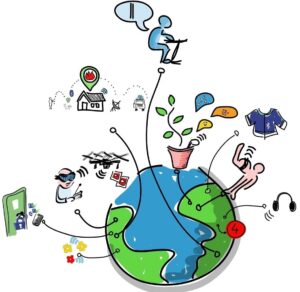The rise of quantum computing: what you need to know?
Quantum computing is an emerging field that leverages the principles of quantum mechanics to process information in ways that classical computers cannot. This article will explore the rise of quantum computing, its fundamental concepts, current advancements, potential applications, and the challenges it faces.
Understanding Quantum Computing
At its core, quantum computing differs from classical computing in how it processes data. Classical computers use bits as the smallest unit of information, which can be either a 0 or a 1. In contrast, quantum computers use quantum bits, or qubits, which can exist in multiple states simultaneously due to the principles of superposition and entanglement. This allows quantum computers to perform complex calculations at unprecedented speeds.
Key Principles of Quantum Mechanics
1. **Superposition**: Unlike a classical bit, which is either 0 or 1, a qubit can be in a state of 0, 1, or both at the same time. This property enables quantum computers to explore multiple solutions simultaneously.
2. **Entanglement**: Qubits can become entangled, meaning the state of one qubit is directly related to the state of another, regardless of the distance between them. This phenomenon allows for faster information transfer and processing.
3. **Quantum Interference**: Quantum algorithms utilize interference to amplify the probabilities of correct answers while canceling out incorrect ones, enhancing the efficiency of computations.
The Current State of Quantum Computing
The field of quantum computing has seen significant advancements in recent years. Major tech companies, including IBM, Google, and Microsoft, are investing heavily in quantum research and development. Startups are also emerging, focusing on various aspects of quantum technology, from hardware to software solutions.
Notable Developments
– **Quantum Supremacy**: In 2019, Google claimed to have achieved quantum supremacy, demonstrating that their quantum computer could perform a specific task faster than the most powerful classical supercomputers. This milestone marked a significant step forward in proving the potential of quantum computing.
– **Quantum Algorithms**: Researchers are developing algorithms that can solve complex problems more efficiently than classical algorithms. Shor’s algorithm for factoring large numbers and Grover’s algorithm for searching unsorted databases are prime examples.
– **Quantum Hardware**: Various approaches to building quantum computers are being explored, including superconducting qubits, trapped ions, and topological qubits. Each method has its advantages and challenges, contributing to the ongoing race to create a scalable quantum computer.
Potential Applications of Quantum Computing
The potential applications of quantum computing are vast and varied, spanning multiple industries. Here are some key areas where quantum computing could make a significant impact:
1. **Cryptography**: Quantum computers have the potential to break traditional encryption methods, prompting the need for quantum-resistant algorithms. Conversely, quantum key distribution offers a new way to secure communications.
2. **Drug Discovery**: Quantum computing can simulate molecular interactions at an unprecedented level of detail, accelerating the drug discovery process and leading to more effective treatments.
3. **Optimization Problems**: Industries such as logistics, finance, and manufacturing face complex optimization challenges. Quantum algorithms can provide solutions that are currently infeasible for classical computers.
4. **Artificial Intelligence**: Quantum computing could enhance machine learning algorithms, enabling faster data processing and improved pattern recognition.
5. **Climate Modeling**: Quantum computers can simulate complex climate models, helping scientists understand and predict climate change more accurately.
Challenges Facing Quantum Computing
Despite its potential, quantum computing faces several challenges that must be addressed before it can become mainstream:
1. **Error Rates**: Qubits are highly susceptible to errors due to decoherence and noise. Developing error-correcting codes and more stable qubit designs is crucial for reliable quantum computation.
2. **Scalability**: Building a quantum computer with a sufficient number of qubits to solve practical problems remains a significant hurdle. Researchers are exploring various architectures to achieve scalability.
3. **Talent Shortage**: The field of quantum computing requires a unique blend of skills in physics, computer science, and engineering. There is a growing demand for professionals with expertise in quantum technologies.
4. **Regulatory and Ethical Considerations**: As quantum computing advances, ethical considerations regarding its applications, particularly in cryptography and surveillance, will need to be addressed.
The Future of Quantum Computing
The future of quantum computing is promising, with ongoing research and investment driving the field forward. As technology matures, we can expect to see more practical applications emerge, transforming industries and solving problems that were previously thought to be insurmountable.
Collaboration and Open Source
Collaboration among academia, industry, and government will be essential for advancing quantum computing. Open-source initiatives, such as IBM’s Qis kit and Google’s Cir q, are fostering a community of developers and researchers who can contribute to the field’s growth.
Education and Awareness
Increasing awareness and education about quantum computing will be vital for preparing the next generation of scientists and engineers. Universities are beginning to offer specialized programs in quantum computing, and online resources are becoming more accessible.
Conclusion
The rise of quantum computing represents a paradigm shift in how we approach computation. With its unique principles and vast potential applications, quantum computing is poised to revolutionize various fields. However, significant challenges remain, and continued research, collaboration, and education will be crucial in realizing its full potential. As we move forward, staying informed about developments in quantum technology will be essential for anyone interested in the future of computing. ### Understanding Quantum Computing
At its core, quantum computing differs from classical computing in how it processes data. Classical computers use bits as the smallest unit of information, which can be either a 0 or a 1. In contrast, quantum computers use quantum bits, or qubits, which can exist in multiple states simultaneously due to the principles of superposition and entanglement. This allows quantum computers to perform complex calculations at unprecedented speeds.
Key Principles of Quantum Mechanics
1. **Superposition**: Unlike a classical bit, which is either 0 or 1, a qubit can be in a state of 0, 1, or both at the same time. This property enables quantum computers to explore multiple solutions simultaneously.
2. **Entanglement**: Qubits can become entangled, meaning the state of one qubit is directly related to the state of another, regardless of the distance between them. This phenomenon allows for faster information transfer and processing.
3. **Quantum Interference**: Quantum algorithms utilize interference to amplify the probabilities of correct answers while canceling out incorrect ones, enhancing the efficiency of computations.
### The Current State of Quantum Computing
The field of quantum computing has seen significant advancements in recent years. Major tech companies, including IBM, Google, and Microsoft, are investing heavily in quantum research and development. Startups are also emerging, focusing on various aspects of quantum technology, from hardware to software solutions.
Notable Developments
– **Quantum Supremacy**: In 2019, Google claimed to have achieved quantum supremacy, demonstrating that their quantum computer could perform a specific task faster than the most powerful classical supercomputers. This milestone marked a significant step forward in proving the potential of quantum computing.
– **Quantum Algorithms**: Researchers are developing algorithms that can solve complex problems more efficiently than classical algorithms. Shor’s algorithm for factoring large numbers and Grover’s algorithm for searching unsorted databases are prime examples.
– **Quantum Hardware**: Various approaches to building quantum computers are being explored, including superconducting qubits, trapped ions, and topological qubits. Each method has its advantages and challenges, contributing to the ongoing race to create a scalable quantum computer.
### Potential Applications of Quantum Computing
The potential applications of quantum computing are vast and varied, spanning multiple industries. Here are some key areas where quantum computing could make a significant impact:
1. **Cryptography**: Quantum computers have the potential to break traditional encryption methods, prompting the need for quantum-resistant algorithms. Conversely, quantum key distribution offers a new way to secure communications.
2. **Drug Discovery**: Quantum computing can simulate molecular interactions at an unprecedented level of detail, accelerating the drug discovery process and leading to more effective treatments.
3. **Optimization Problems**: Industries such as logistics, finance, and manufacturing face complex optimization challenges. Quantum algorithms can provide solutions that are currently infeasible for classical computers.
4. **Artificial Intelligence**: Quantum computing could enhance machine learning algorithms, enabling faster data processing and improved pattern recognition.
5. **Climate Modeling**: Quantum computers can simulate complex climate models, helping scientists understand and predict climate change more accurately.
Challenges Facing Quantum Computing
Despite its potential, quantum computing faces several challenges that must be addressed before it can become mainstream:
1. **Error Rates**: Qubits are highly susceptible to errors due to decoherence and noise. Developing error-correcting codes and more stable qubit designs is crucial for reliable quantum computation.
2. **Scalability**: Building a quantum computer with a sufficient number of qubits to solve practical problems remains a significant hurdle. Researchers are exploring various architectures to achieve scalability.
3. **Talent Shortage**: The field of quantum computing requires a unique blend of skills in physics, computer science, and engineering. There is a growing demand for professionals with expertise in quantum technologies.
4. **Regulatory and Ethical Considerations**: As quantum computing advances, ethical considerations regarding its applications, particularly in cryptography and surveillance, will need to be addressed.
The Future of Quantum Computing
The future of quantum computing is promising, with ongoing research and investment driving the field forward. As technology matures, we can expect to see more practical applications emerge, transforming industries and solving problems that were previously thought to be insurmountable.
Collaboration and Open Source
Collaboration among academia, industry, and government will be essential for advancing quantum computing. Open-source initiatives, such as IBM’s Qis kit and Google’s Cit q , are fostering a community of developers and researchers who can contribute to the field’s growth.
Education and Awareness
Increasing awareness and education about quantum computing will be vital for preparing the next generation of scientists and engineers. Universities are beginning to offer specialized programs in quantum computing, and online resources are becoming more accessible.
Conclusion
The rise of quantum computing represents a paradigm shift in how we approach computation. With its unique principles and vast potential applications, quantum computing is poised to revolutionize various fields. However, significant challenges remain, and continued research, collaboration, and














Post Comment